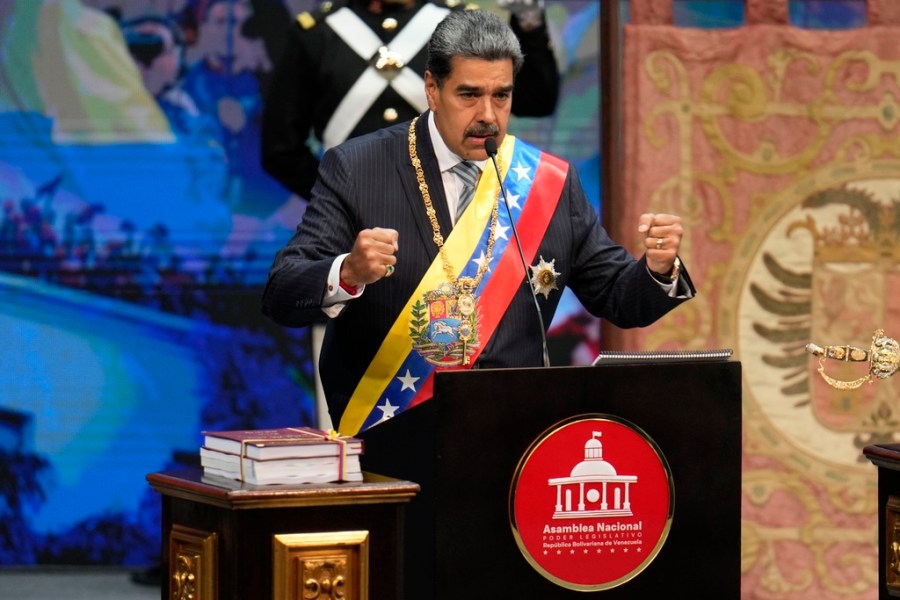
On Friday, Venezuelan President Nicolás Maduro was sworn in for his third six-year term, defying critics in the international community who say his victory in July’s election was illegitimate.
Retribution against the re-anointed Maduro came swiftly. That same day, the U.S. and its allies announced sanctions on seniormost figures in his administration, not least the head of the state oil company, PdVSA.
President Biden is finishing his term with a hawkish flourish, perhaps frustrated that his “stick not carrot” attempt to oust Maduro from power has come to nought.
Biden mishandled Venezuela, freezing then unfreezing sanctions on its natural resources. Energy imports stuttered and migratory flows soared as a result; in turn, inflation and the southern border crisis arguably cost the Democrats the 2024 election.
As one inauguration ends, attention turns to Donald Trump’s Jan. 20 inauguration. His first 100 days in office will set the tone for U.S.-Venezuela relations for at least a decade.
At face value, the Republicans’ longstanding hostility to Maduro and the incoming Cabinet’s composition point to a hawkish policy. Many expect sanctions on Venezuelan energy to remain in place, regardless of their inflationary effect.
Yet Trump, the consummate realist, may see things differently. He wants U.S. oil companies to expand domestic production, but doing so is expensive, especially with rising interest rates. If Trump’s summons are rebuked, he will look abroad to reduce prices at the pump.
Of similar importance was the Republicans’ promise to secure the southern border. As I highlighted in a piece for The Hill in December, more than 7.7 million migrants have fled Venezuela as of May 2024, with the U.S. serving as their destination of choice.
Maduro, given no incentive to offer support, has refused to accept their return.
This is a lose-lose-lose situation. Working-age citizens have fled Venezuela; these migrants suffer on the journey and at the border; and arrivals have fanned anti-immigration sentiment.
Favoring a firm response, Republican hawks may have their way in the opening weeks, slamming the door shut in the face of desperate Venezuelans instead of solving the root of the problem.
But as with energy, realpolitikpredicts that Trump will soon realize that he cannot secure the border without reaching an accommodation with Maduro. In essence, talking tough against socialist Venezuela may temporarily please the MAGA base, but it is cheap energy and low immigration that will keep the GOP in power past 2028.
There are already senior figures close to Trump who accept this logic.
Richard Grenell, nominated as a “special missions” troubleshooter, has historically supported engagement with Maduro. GOP donors with energy sector interests likewise back a reconciliation given Venezuela has the largest proven oil reserves on earth — a fact Trump is said to be well aware of.
If the appetite is there, what might détente look like?
In October 2023, U.S.-Venezuela relations took a step in the right direction with the signing of the Barbados Agreement. This temporarily froze sanctions on Venezuelan energy, with Western oil majors intensifying exports to the U.S. and European markets.
However, in April 2024, the Biden administration let the agreement expire. It judged that Maduro had not done enough to guarantee fair elections.
If the past ten years have proved anything, it’s that sanctions and diplomatic coercion have definitively failed to remove Maduro.
This includes Juan Guaidó’s shadow presidency of 2019 to 2023, where the U.S. recognized Guaidó as Venezuela’s legitimate leader — only for his attempted overthrow of Maduro to fizzle out before it started.
Trump will not want to repeat this with the current opposition. He will also reject out of hand the calls for an international military intervention, made most recently by former Colombian President Álvaro Uribe.
Instead, given that Trump is much less interested in democracy promotion than his predecessor, he may prove better able to stick to a quid pro quo deal on realist grounds.
This would trade sanctions relief for, one would expect, Venezuela agreeing to accept the return of migrants. Trump might also demand that Maduro pulls back from deepening ties with China, Russia and Iran.
If the new administration can halt Maduro’s journey into that orbit — and at the same time boost energy imports and cut migratory flows — then Trump will have his first major diplomatic victory.
If sanctions are intensified, then Venezuelans will suffer another miserable decade; a frustrated but empowered Maduro will hit back; and American energy security will be undermined.
Despite being unlikely partners, enough common ground exists for Trump and Maduro to ease tensions. Let us hope that the “art of the deal” is still alive and well.
Jose Chalhoub is an analyst at Jose Parejo and Associates and oil market expert.












